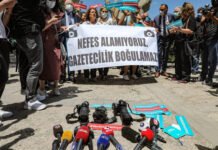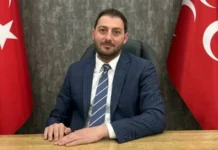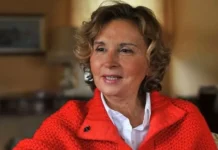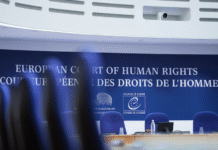Famous American Science magazine has covered the case of NASA scientist Serkan Gölge, who has been a victim of the massive post-coup witch hunt campaign conducted by Turkish government under the rule of autocratic President Recep Tayyip Erdoğan targeting the alleged members of the Gülen movement.
Writing that “Early next month, Serkan Gölge will learn whether his nightmare will continue,” the Science has reminded that “In July 2016, he and his family were in southern Turkey wrapping up a visit to relatives and preparing to return home to Houston, Texas, where the Turkish-American space scientist studies the effects of radiation on astronauts. But before his wife, Kübra, could finish strapping their two young sons into car seats, police arrived and took Gölge away.”
“The police accused him of spying for the Central Intelligence Agency, and last April they charged the dual citizen with terrorism,” wrote the magazine.
“We were all stunned. It didn’t make any sense,” says computer scientist Alicia Hofler, a former colleague of Gölge’s at Old Dominion University in Norfolk, Virginia. A verdict is expected on February 8; if convicted, Gölge faces up to 15 years in prison.
“He is one of several US citizens and thousands of Turkish academics caught up in a crackdown following a July 2016 coup attempt. Scores of scientists are in prison, and many more have lost their jobs. Most academics now need permission to travel abroad,” said the magazine and added that “Turkey’s president, Recep Tayyip Erdoğan, asserts the measures are necessary for national security: to root out allies or sympathizers of Fethullah Gülen, a cleric living in exile in Pennsylvania whom Erdoğan has accused of masterminding the coup. But the crackdown quickly widened and has swept up even leftist and liberal opponents.”
Harsh measures under an ongoing state of emergency could threaten the future of Turkish science, observers say. As long as a travel ban persists and “scientists currently jailed are not released, people won’t be able to maintain their relations abroad,” told Eugene Chudnovsky, a physicist at the City University of New York’s Lehman College and co-chair of the Committee of Concerned Scientists, a nonprofit dedicated to protecting scientists’ human rights, to the magazine.
Ironically, before the coup Erdoğan was widely regarded as a patron of science, Chudnovsky says. “Many Turkish scientists will say that their situation had improved tremendously in terms of their economic situation, their ability to travel internationally,” he says. “Now, of course, scientists are worried.”
“Soon after the failed coup, authorities raided the Scientific and Technological Research Council of Turkey, the government research funding agency known by its Turkish acronym TÜBİTAK, arresting dozens. The purge reached the higher education system, where some 5000 academics accused of ties to Gülen have been dismissed, suspended, or forced to resign,” reported Science.
“That frenzy ensnared Gölge. According to Kübra Gölge, an estranged family member who held a grudge over an inheritance dispute told authorities Gölge was a terrorist and a spy. He has denied the charges; in court months later, the relative who tipped off police stated he was only 1 percent sure the accusations he leveled were actually true, says Kübra, who has attended the trial. As evidence of Gölge’s guilt, prosecutors pointed to the fact that he, like many Turks, holds an account in a bank owned by Gülen followers, and he studied at a university with ties to Gülen,” said Science.
According to the report, another Turkish-American scientist caught in the dragnet is İsmail Kul, a chemist at Widener University in Chester, Pennsylvania. According to Turkish media reports, Kul and his brother were arrested on a visit to Turkey in 2016 and accused of participating in the attempted coup. In court, Kul denied the charges, though he acknowledged having met Gülen several times since 2010, when he was introduced to the cleric by a Turkish legislator in Erdoğan’s ruling Justice and Development Party (AKP). Kul is out on bail while his trial continues.
Those Turkish scientists spared persecution have seen international collaborations wither. Academics now must obtain permission from university administrators to travel abroad, and TÜBİTAK has reportedly curtailed travel scholarships for students and researchers. Many who manage to get out have not come back, accelerating Turkey’s brain drain, according to İlker Birbil, a Turkish data scientist at Erasmus University in Rotterdam, the Netherlands.
According to the report, Birbil, who left Turkey in January 2017, faced difficulties after signing a petition in 2016 calling on the government to resume peace talks with Kurdish militants. Taking a stand had repercussions, he says. “We suddenly realized that it was impossible for us to get funding from TÜBİTAK,” he says. “In a nutshell, they don’t really go after merit anymore.”
After signing the petition, İzge Günal says he was forced to resign from the orthopedics department at Dokuz Eylül University in İzmir, Turkey. Günal, who remains in Turkey, foresees a steady decline of Turkish science, “replacing Enlightenment thought with superstitions.” In public comments, Turkey’s science minister, Faruk Özlü, has denied that the government is pressuring scholars or interfering in TÜBİTAK’s reviews.
“What happens to Kul and Gölge could hinge on tensions between Turkey and the United States, which has supported Kurdish rebels in Syria and has balked at extraditing Gülen. In a televised speech last September, Erdoğan said Andrew Brunson, a pastor and US citizen jailed in Turkey, would not be returned until the United States extradited Gülen. The comments left Gölge’s family fearful that he, too, could effectively be used as a bargaining chip,” wrote Science.
“The uncertainty is excruciating, Kübra says. For the first 3 months after her husband was arrested, ‘Every cell in my body was aching because of the pain in my soul,’ she says. ‘My life turned upside down and I felt like my family was falling apart.’ Hers is only one of many families in limbo,” concluded the report of Science magazine.
Science has been at the center of important scientific discovery since its founding in 1880, with seed money from Thomas Edison. Today, Science continues to publish the very best in research across the sciences, with articles that consistently rank among the most cited in the world.
Turkey survived a controversial military coup attempt on July 15, 2016 that killed 249 people. Immediately after the putsch, the Justice and Development Party (AKP) government along with President Erdoğan pinned the blame on the Gülen movement.
Gülen, who inspired the movement, strongly denied having any role in the failed coup and called for an international investigation into it, but President Erdoğan — calling the coup attempt “a gift from God” — and the government initiated a widespread purge aimed at cleansing sympathizers of the movement from within state institutions, dehumanizing its popular figures and putting them in custody.
Turkey has suspended or dismissed more than 150,000 judges, teachers, police and civil servants since July 15. Turkey’s Interior Minister announced on December 12, 2017 that 55,665 people have been arrested. Previously, on December 13, 2017, The Justice Ministry announced that 169,013 people have been the subject of legal proceedings on coup charges since the failed coup.
A total of 48,305 people were arrested by courts across Turkey in 2017 over their alleged links to the Gülen movement, said Turkish Interior Minister Süleyman Soylu on Dec. 2, 2018. “The number of detentions is nearly three times higher,” Soylu told a security meeting in İstanbul and claimed that “Even these figures are not enough to reveal the severity of the issue.”















